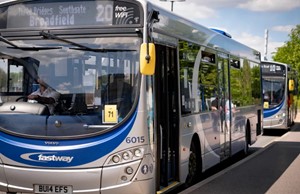News
Ricardo delivers H2 safety training to Brighton and Hove Buses, Metrobus
Ricardo is applying its world-leading expertise in chemical training to enable Brighton & Hove Buses and Metrobus to implement innovative H2 technology safely in support of corporate and national decarbonization goals.
Ricardo, a global strategic environmental and engineering consulting company, has successfully delivered H2 awareness, safety and incident response training to employees at Brighton & Hove Buses and Metrobus to support their fleet of H2 powered buses.
During 2023, Brighton & Hove Buses and Metrobus will have in their operation 20 H2 fuel cell buses on the Metrobus Fastway route 10 serving Crawley, London Gatwick Airport and Horley in the UK. The single-decker fuel cell buses are gap funded with money from JIVE (joint initiative for H2 vehicles across Europe): a project administered by the Clean H2 Partnership (former fuel cells and H2 joint undertaking) under the European Union Horizon 2020 framework program for research and innovation, plus investment from Gatwick Airport. Brighton & Hove Buses and Metrobus are part of JIVE that will deploy nearly 300 fuel cell buses in 22 European cities by the early 2020s – the largest deployment in Europe to date.
Thanks to the proven global reputation of its National Chemical Emergency Centre (NCEC), Ricardo was appointed by Brighton & Hove Buses and Metrobus to deliver expert, accredited training on awareness, safety and incident response in relation to H2 and fuel cells to operational staff both virtually and in person at bus depots across West Sussex. This training will enable key members of staff to carry out operations supporting H2 infrastructure safely but also have the best possible preparation to resolve a real incident safely and efficiently. Because of the success and efficacy of the training, Ricardo is now being recommended by Brighton & Hove Buses and Metrobus to the JIVE with a recommendation that training is made mandatory under the initiative.
Rachel White, Global President Clean Energy and Environmental Solutions at Ricardo, said, “The transport sector has a significant role to play not only in reducing greenhouse gas emissions and decarbonization, but also using technological innovation to help improve air quality and public health. H2 can help organizations and countries achieve a low carbon future, and deliver economic growth and green jobs, but it is important to implement this emerging technology safely, and Ricardo has a proven track record supporting clients across the H2 value chain. Ricardo’s National Chemical Emergency Centre is internationally renowned for its chemical safety support and emergency response services and has been the trusted partner of the world’s leading chemical companies for nearly 50 years. We are honored that Brighton & Hove Buses and Metrobus entrusted us to help keep their teams safe which is helping to shape a cleaner, safer world.”
Ed Wills, Managing Director of Brighton & Hove Buses, said, “To support our ambition of reducing our carbon footprint and decarbonizing our operations, then H2 is going to be critical to our success. Through the training with Ricardo’s team of chemical experts, we now have a detailed understanding and the confidence to safely manage the use of H2 within our operations. We’re excited that this H2 training will support us in the decarbonization of the 60 million passenger journeys we deliver each year.”
NCEC is a global center of excellence for emergency response and chemical safety, with half a century of experience in the theoretical, technical and operational knowledge involved in the management of hazmat incidents. NCEC works with international public and private sector organizations including 50% of the top 100 chemical manufacturers globally, all of which face a range of complex hazmat risk and compliance challenges. Each year, the emergency response team manages more than 4,000 incidents and receives over 8,000 calls.
This project is the latest example of Ricardo furthering the safe and sustainable adoption of H2 technology in Sussex. On February 13, 2023, Ricardo announced it has developed the H2 strategy for Greater Brighton, with the intention of encouraging inward investment in this green technology on the south coast of England.


